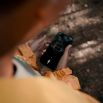The Google Science Fair is down to just 15 finalists. Chosen from a collection of 90 semi-finalists, these final 15 young scientists represent the newest generation of scientists from around the world.
These young finalists come from the United States, Canada, Singapore, Greece, Turkey, Russia, India and Australia. Nine of the are young women.
Ann Makosinski developed a flashlight that runs on body heat. The 16-year-old from Canada used four Peltier tiles to generate electricity from the difference in temperature between your hand and the ambient air.
Elif Bilgin from Turkey spent two years researching how to turn banana peels into plastic.
"In this project, I developed a method for making plastic by using banana peels and found new areas for the use of the plastic that I manufactured: using the bio-plastic in the making of cosmetic prosthesis and in the insulation of cables," Bilgin said.
Alex Spride made the finals with his Squid-jet, an underwater propulsion system that uses the compression of a bladder to release air, inspired by biological systems.
Elizabeth Zhao developed a new way to diagnose melanoma, a form of cancer that took the life of the mother of one of her friends.
"I wanted to do something to help the countless people affected by this disease, and that is what drove me to do my project," Zhao said.
Valerie Ding may be the only one of the finalists who has a minor planet named after her - 27392 Valerieding. She modeled new ways to design solar dot cells, which could double the efficiency of solar cells.
Kativa Selva coated a thin layer of superconducting material on a metal tape. These could be used as replacements for permanent magnets made of rare-earth, which has been restricted by China, which holds 97 percent of the world's supply.
Shrishti Asthana found a way of using zinc oxide as a catalyst to assist sunlight in cleaning detergents from industrial waste water.
There were thousands of entries into the Google Science Fair, from young people representing 120 countries.
Elif Bilgin has already won the Scientific American Science in Action Award for her work on bioplastics. This $50,000 scholarship is awarded to a finalist who has made a practical difference in an environmental, health, or resources issue. She is still eligible to win the grand prize as well.
Final judging will take place September 23, 2013. The grand prize winner will receive a $50,000 scholarship and a ten-day trip to the Galapagos Islands, sponsored by National Geographic.









